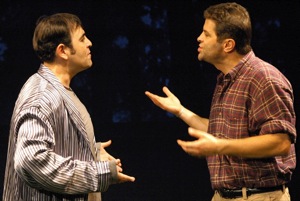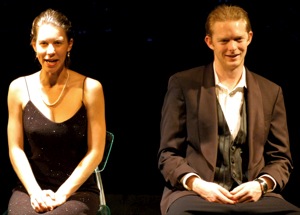-
- Same-sex couples rush to wed ahead of Calif. election
- Mormon same-sex marriage supporters deliver petitions
- Group demands W.Va. session to ban same-sex marriage
- Fla. marriage amendment will be decided Nov. 4
- NY court hears challenge in same-sex marriages case
- Church to pay denomination $1.75 million in settlement
- National News Briefs
- World News Briefs
Theater
LaBute X 2 and the light in that piazza
Published Thursday, 23-Oct-2008 in issue 1087
‘In a Dark Dark House’ and ‘bash: the latterday plays’
Playwright Neil LaBute writes about the shadowy places in the psyche where pain and evil lurk. More often than not, women are his victims, as in his horrifyingly plausible film In the Company of Men, in which two suits plot to humiliate a vulnerable woman just for sport.
Now ion theatre presents two LaBute works – In a Dark Dark House and bash: the latter-day plays – in repertory through Nov. 1 at The Lab in Mission Valley. Glenn Paris directs.
Family dysfunction, child sexual abuse, infanticide and murder: LaBute (who has claimed the battle cry “Don’t make nice, make a mess”) wants to make you squirm and knows how to do it.
Greek myth meets contemporary American sensibility in the 1999 bash: the latter-day plays, a trilogy of one-act monologues exploring the possible consequences of fear, pain and conviction.
The characters are Mormon (LaBute became a Mormon in his student days at Brigham Young University and remained in the church until 2005), but their actions echo Greek tragedy. In Iphigenia in Orem (a Salt Lake City suburb), a businessman (Brian Mackey) grapples with the fear of being downsized while charged with the care of his infant son.
In Medea Redux, a woman (Rachael VanWormer) in a police interrogation room tries to explain the death of her 14-year-old son who, she tells us, was the offspring of seduction and subsequent abandonment by her 7th grade teacher.
A Gaggle of Saints finds Sue (VanWormer) and John (Mackey), longtime sweethearts and now college students on holiday in New York City. While Sue sleeps off a bit too much partying, her ebullient, blond boyfriend and a few friends, on a midnight walk in Central Park, come across an aging gay man and calmly, almost gleefully beat him, probably to death.
VanWormer and Mackey are chilling and terrific (but not easy to watch) in these tour de force scenes, well directed by Paris.
In a Dark Dark House is a later (2007) and more personal work in which two brothers try to come to terms with with each other, their less-than-adequate parents and long-ago child sexual abuse. The play opens on the grounds of a psychiatric facility where Drew (Claudio Raygoza) has been confined for observation after a drunk-driving accident. Drew’s elder brother Terry (Jeffrey Jones) has driven several hours on request of the facility, which wants him to verify Drew’s previously unmentioned story of sexual abuse at the hands of a family friend named Todd.
Terry, an underemployed military veteran, is a walking powder keg of hurt, anger and resentment toward the family, who he feels betrayed him into four years in juvenile lockup after a carjacking incident. Terry has always considered his little brother a wuss and a whiner.
Despite some self-destructive tendencies, Drew has parried a sunny personality and a law degree to wealth, position and a nice family. He thinks Terry is jealous of his money.
Raygoza and Jones play well off each other in this disquieting and enigmatic piece.
LaBute specializes in the unsuspected dénouement, and does not disappoint here. But the drama is in the faltering and painful steps these two take toward communication and wholeness.
LaBute has said he grew up in a “dark dark house” himself, and that this was the most difficult play for him to write. It offers some difficulties for the viewer as well.
House is a psychological sandwich of two heavy scenes between the brothers, separated by an enigmatic encounter between Terry and Jennifer (Rachael VanWormer), the 16-year-old daughter of Todd, the abuser Terry is trying to track down. He finds her tending to her father’s mini-golf course; she flirts, he flirts back and then the scene ends, and we never find out what happens to her, or indeed why the scene is in the play.
But that’s LaBute. If you’re looking for a play where the plot strands are nicely tied up at the end, this isn’t it. LaBute challenges, confuses and sends you down blind alleys. He also fascinates, keeps you thinking and involved.
It’s theater of the highest order.
ion theatre’s production of In a Dark Dark House and bash: the latterday plays are in repertory through Nov. 1, 2008 at The Lab in Mission Valley. Shows Thursday through Saturday at 8 p.m. and Sunday at 7 p.m. For more information, visit www.gaylesbiantimes.com/links/1087.
‘The Light in the Piazza‘
A sudden gust blows a young woman’s straw hat into the arms of her as-yet-unmet lover. A couple manages to find love even though they do not share a common language.
It’s Florence in the summer, love is in the air and the unabashedly romantic musical The Light in the Piazza is in its regional premiere and has been extended through Nov. 9 at Lamb’s Players Theatre, directed by Robert Smyth. Light won six of the 11 Tonys for which it was nominated in 2005.
And how could it not? Light boasts a book by Craig Lucas and music and lyrics by Adam Guettel, grandson of Richard Rodgers, who together with Stephen Sondheim wrote a musical on a similar theme forty years earlier (Do I Hear a Waltz?, based on the Arthur Laurents play Time of the Cuckoo).
It’s 1953, and Margaret Johnson (Deborah Gilmour Smyth), an upper middle class housewife from North Carolina, has taken her “special” daughter Clara (Season Duffy) on holiday in Florence where, among the art and the ruins, Clara meets and falls in love with 20-year-old Fabrizio Naccarelli (Chanlon Jay Kaufman), son of a Florentine haberdasher. He finds her charming and childlike, little suspecting either her real age (26) or the nature of her “specialness.”
Margaret, suffering the quiet disintegration of her own marriage, isn’t prepared for her daughter’s romance, nor for the voluble Italian family that surrounds Fabrizio. She’s torn between the protective instinct to try to stop the relationship and wanting her daughter to have the love she lacks. Margaret is hesitant to bring up the childhood brain injury that has halted Clara’s intellectual and emotional growth, and fearful of even mentioning Fabrizio to husband Roy (David Cochran Heath), lest he jump on a plane and drag Clara back to North Carolina.
But fear not, this is a musical about Italy in the summer.
Smyth anchors the cast as Margaret, in a complex role which requires her not only to sing like an angel (an easy task for her) but to convey subtle shades of emotion with a look or a slight movement. Smyth does not disappoint.
Duffy is heartbreaking as the girl/woman Clara, with the enthusiasm of a child and the needs of a woman. She is well matched dramatically and musically with Kaufman’s soaring tenor as Fabrizio.
They are ably supported by Spencer Rowe, Teresa Byrne and Sandy Campbell as the rest of the boisterous Naccarelli clan, though Byrne’s voice seemed too big for the space on opening night.
Mike Buckley’s set and Jeanne Reith’s costumes are splendid as always, as is the larger-than-usual combo engaged for this show – eight musicians, ranged at eye level along the slightly raised Uffizi-look set. I’d be willing to bet that the opening-night uneven sound levels and rocky balance between voices and instruments have been remedied.
If you’re of a cynical turn of mind, this show is not for you. But if you are, ever were or want to be romantic, hie thee to Italy. While you’re arranging that, see The Light in the Piazza.
The Light in the Piazza has been extended through Nov. 9, at Lamb’s Players Theatre in Coronado. Shows Tuesday through Thursday at 7:30 p,m. Friday and Saturday at 8 p.m. Matinees Saturday at 4 p.m. and Sunday at 2 p.m. For more information, visit www.gaylesbiantimes.com/links/1087.
|
|
Copyright © 2003-2025 Uptown Publications



